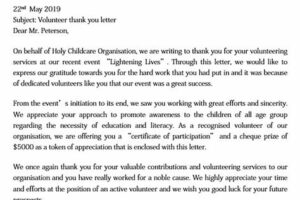Table of Contents
Learn how to effectively showcase your volunteer work on your resume. Discover the best strategies to highlight your skills and experiences gained through volunteering, and make a positive impact on potential employers. Follow our step-by-step guide to seamlessly integrate your volunteer work into your resume and stand out from the competition.
Adding volunteer work to your resume can be a game-changer, showcasing your dedication to making a positive impact and enhancing your professional profile. Whether you are a recent graduate, career changer, or seasoned professional, the inclusion of volunteer experience demonstrates not only your passion for giving back but also your ability to balance multiple commitments and contribute to the community. By strategically incorporating your volunteer work into your resume, you can effectively highlight valuable skills, showcase your leadership abilities, and differentiate yourself from other candidates in a highly competitive job market. So, let’s explore how you can skillfully add volunteer work to your resume and impress potential employers with your well-roundedness and commitment to making a difference.
Introduction
Adding volunteer work to your resume is an excellent way to showcase your dedication, skills, and passion for making a positive impact in your community or the world. Whether you have volunteered for a non-profit organization, participated in community events, or served on a board or committee, this article provides valuable insights on how to effectively incorporate your volunteer experience into your resume.
Identify Relevant Volunteer Experience
Before adding volunteer work to your resume, it’s essential to evaluate the relevance of your experience to the position you are applying for. Determine which aspects of your volunteer work align with the skills and requirements of the desired job. For example, if you are applying for a marketing position, highlight any volunteer experience related to social media management, event planning, or content creation.
Showcase Skills Developed During Volunteer Work
Volunteer work often allows individuals to develop a wide range of valuable skills. Identify and emphasize the specific skills you have gained through your volunteer experiences. These could include leadership, teamwork, communication, problem-solving, project management, or organizational skills. By showcasing these skills, you demonstrate your ability to adapt and contribute effectively in diverse professional settings.
Structure Your Resume
When incorporating volunteer work into your resume, structure it in a way that highlights its importance alongside your professional experience. Consider creating a separate section dedicated to volunteer work or including it under relevant job experiences. Ensure that the format and layout of your resume remain consistent throughout.
Include Clear and Detailed Descriptions
Provide clear and concise descriptions of your volunteer work. Explain the organization you volunteered for, the duration of your service, and your specific responsibilities and accomplishments. Use action verbs to highlight your contributions and impact. For example, Managed a team of volunteers for a fundraising event that raised $10,000 for a local shelter.
Quantify Achievements
To make your volunteer experience more impressive, quantify your achievements whenever possible. Numbers and statistics can effectively demonstrate the impact you made during your volunteer work. For instance, if you organized a charity run, mention the number of participants or the amount of funds raised. These quantifiable achievements add credibility to your resume.
Highlight Leadership Roles
If you held leadership roles during your volunteer work, emphasize them on your resume. Leadership positions indicate your ability to take initiative, manage teams, and drive projects to success. Mention any chairperson, team leader, or board member roles you have undertaken, along with the outcomes you achieved in those positions.
Include Relevant Training or Certifications
If you received any training or certifications during your volunteer work, include them on your resume. These additional qualifications can enhance your profile and demonstrate your commitment to personal and professional development. For example, if you volunteered as a disaster response team member, mention any relevant first aid or emergency management certifications.
Show Alignment with Company Values
Research the company or organization you are applying to and identify their core values. Align your volunteer experiences with these values in your resume. This demonstrates your ability to connect with the company’s mission and shows potential employers that you share their commitment to making a positive impact.
Emphasize Transferable Skills
Lastly, emphasize the transferable skills gained through your volunteer work that are applicable to the job you are seeking. These skills may include adaptability, problem-solving, teamwork, and empathy. By highlighting these transferable skills, you illustrate your ability to bring value to the organization beyond your professional experience.
Conclusion
Incorporating volunteer work into your resume effectively can significantly enhance your chances of landing your desired job. By identifying relevant experiences, showcasing skills, quantifying achievements, and aligning with company values, you present yourself as a well-rounded candidate with a strong dedication to making a difference. Remember, volunteering is not only beneficial for the community but also for your professional growth.
Introduction to Adding Volunteer Work to Your Resume:
Adding volunteer work to your resume can greatly enhance your professional profile by showcasing your commitment to social causes and community involvement. Including volunteer experience can demonstrate valuable skills such as leadership, teamwork, and empathy. Here are the steps to effectively showcase your volunteer work on your resume.
When applying for a job, it is important to present yourself as a well-rounded individual who not only excels in your professional field but also actively contributes to the betterment of society. One way to achieve this is by adding your volunteer work to your resume. By including your volunteer experience, you not only highlight your dedication to social causes but also showcase your transferable skills that can be valuable in many professional settings.
Choose Relevant Volunteer Experience:
When adding volunteer work to your resume, it is crucial to select experiences that align with the job you are applying for or that highlight transferable skills. Employers are interested in candidates who possess skills such as project management, event coordination, and community outreach, as these skills can be applied to various roles and industries.
Consider the specific job requirements and responsibilities and choose volunteer experiences that directly relate to those. For example, if you are applying for a project management position, highlight your experience leading a volunteer project where you successfully managed a team and coordinated timelines and resources.
Highlight Key Skill Sets:
Under each volunteer role, make sure to highlight the specific skills you acquired or utilized during your service. Tangible skills such as organization, communication, problem-solving, and interpersonal skills should be emphasized to showcase your versatility and ability to contribute effectively to a work environment.
For instance, if you volunteered at a local community center organizing events, highlight your ability to coordinate multiple tasks, communicate with diverse groups of people, and solve problems in a fast-paced environment. These skills are highly valued in many professional settings and can greatly enhance your resume.
Specify Time Commitment:
It is essential to include the duration and frequency of your volunteer work on your resume. Indicating the number of hours per week, the length of your commitment, or the total duration of your volunteer service helps potential employers understand the level of dedication and time management skills you possess.
By specifying the time commitment, you demonstrate your ability to balance multiple responsibilities and prioritize your commitments. This information also helps employers assess your reliability and commitment to seeing tasks through to completion.
Emphasize Leadership Roles:
If you held leadership positions within your volunteer organization, make sure to include these prominently on your resume. Leadership roles demonstrate your ability to take initiative, manage teams, and drive projects forward. Specify any managerial or supervisory responsibilities you had and highlight measurable outcomes achieved under your leadership.
Employers value candidates who can effectively lead and inspire others. By highlighting your leadership roles in your volunteer work, you showcase your ability to take charge, make informed decisions, and achieve successful outcomes. This can greatly enhance your professional profile and increase your chances of being considered for leadership positions.
Quantify Impact:
Whenever possible, quantify the impact of your volunteer work. Whether it’s the number of individuals assisted, funds raised, or events organized, providing concrete numbers can demonstrate the scale and significance of your contributions. This allows potential employers to gauge your ability to deliver tangible results.
For example, if you volunteered at a local food bank and helped distribute meals to 500 families each week, mentioning this achievement showcases your ability to manage large-scale operations and make a significant impact on your community. Quantifying your impact adds credibility to your volunteer experience and highlights your ability to achieve measurable outcomes.
Connect Volunteer Work to Relevant Work Experience:
If you can draw connections between your volunteer work and your professional experience, do so in your resume. Highlight any ways in which your volunteer activities have enhanced or complemented your skills and knowledge in your chosen field. This helps bridge the gap between your volunteer work and your professional aspirations.
For instance, if you are applying for a marketing position and have volunteered as a social media manager for a nonprofit organization, emphasize how this experience has allowed you to develop your digital marketing skills, gain a deeper understanding of target audiences, and effectively communicate brand messages. By connecting your volunteer work to your professional experience, you demonstrate your commitment to continuous growth and development in your field.
Create a Separate Volunteer Experience Section:
To give sufficient attention to your volunteer work, create a separate section on your resume dedicated solely to your volunteer experiences. This helps ensure that your volunteer work is not overshadowed by your professional experience and shows potential employers that you value community engagement and social responsibility.
By creating a distinct section for your volunteer experience, you provide a clear and organized presentation of your involvement in social causes. This section should include the name of the organization, your role, key responsibilities, and any notable achievements. By giving your volunteer work its own space, you demonstrate its significance and make it easily accessible for employers to review.
In conclusion,
adding volunteer work to your resume can significantly enhance your professional profile and showcase your commitment to making a positive impact. By choosing relevant experiences, highlighting key skill sets, specifying time commitments, emphasizing leadership roles, quantifying impact, connecting volunteer work to relevant experience, and creating a separate section for volunteer experiences, you can effectively showcase the value you bring to potential employers. Remember to always use a professional tone and voice when describing your volunteer work to ensure a strong and impactful resume.
Adding volunteer work to your resume is a great way to showcase your commitment to making a difference in your community while also highlighting valuable skills and experiences that can make you stand out to potential employers. Here are some key points to consider when incorporating volunteer work into your resume:
Include a dedicated section: Create a separate section on your resume specifically for volunteer work. This will ensure that your volunteer experience receives the attention it deserves and is not overshadowed by your professional work experience.
Highlight relevant skills: When describing your volunteer work, focus on the skills you gained or utilized during your time as a volunteer. Consider including skills such as leadership, communication, teamwork, problem-solving, and adaptability, which are highly sought after by employers.
Provide specific details: Be sure to provide specific information about your volunteer roles. Include the name of the organization, your position or responsibilities, the duration of your involvement, and any notable achievements or projects you were involved in. This will help employers gain a better understanding of your commitment and impact.
Showcase transferable experiences: If your volunteer work directly relates to the industry or job you are applying for, emphasize the transferable experiences and knowledge you gained. For example, if you volunteered at a nonprofit organization and are now applying for a fundraising position, highlight your experience in organizing and executing successful fundraising events.
Quantify your accomplishments: Whenever possible, quantify the impact of your volunteer work. Use numbers or percentages to demonstrate the scale of your contributions. For instance, if you helped raise funds for a charity, mention the amount of money you raised or the number of beneficiaries who were positively impacted.
Explain the relevance: If there is a specific reason why your volunteer work is relevant to the job you are applying for, make sure to explain it briefly. This will help employers understand how your volunteer experiences complement your professional goals and aspirations.
Keep it concise: While it’s important to highlight your volunteer work, remember to keep the descriptions concise and focused. Use clear and succinct language to effectively communicate your achievements and contributions without overwhelming the reader.
Proofread and format: Treat your volunteer work section with the same level of professionalism as the rest of your resume. Proofread carefully for any grammatical errors or typos. Additionally, ensure that the formatting and layout are consistent with the rest of your resume.
Incorporating volunteer work into your resume demonstrates your dedication, initiative, and commitment to making a positive impact. By following these guidelines, you can effectively showcase your volunteer experiences, enhance your overall resume, and increase your chances of landing your desired job.
Thank you for visiting our blog today and taking the time to read our article on how to add volunteer work to your resume. We hope that you have found the information provided helpful and insightful. Adding volunteer experience to your resume can be a valuable asset in today’s competitive job market, and we are here to guide you through the process.
Firstly, it is important to understand the significance of including volunteer work on your resume. Volunteer experience demonstrates your commitment to giving back to the community and showcases your willingness to go above and beyond in contributing to society. Employers often value these qualities, as they indicate a strong work ethic, empathy, and a desire to make a positive impact. By highlighting your volunteer work, you can stand out from other candidates and increase your chances of landing your dream job.
Now, let’s discuss how to effectively incorporate volunteer work into your resume. Begin by creating a dedicated section for your volunteer experience, just like you would for your work experience or education. Include the name of the organization, your role, the duration of your involvement, and a brief description of your responsibilities. Use action verbs and quantify your achievements whenever possible to demonstrate the impact you made during your volunteer work. Additionally, consider tailoring your volunteer experience to align with the job you are applying for. Focus on transferable skills and highlight how your volunteer work has equipped you with relevant abilities that can be applied in a professional setting.
In conclusion, adding volunteer work to your resume is a strategic move that can enhance your chances of standing out to potential employers. It not only showcases your dedication to making a positive impact but also demonstrates valuable skills and qualities that employers seek. By following the steps outlined in this article, you can effectively include your volunteer experience on your resume in a way that highlights your strengths and aligns with your career goals. Best of luck in your job search, and we hope that you find success in incorporating your volunteer work into your resume!
.
When it comes to adding volunteer work to your resume, there are a few key considerations to keep in mind. Here are some common questions people have about this topic:
- Should I include volunteer work on my resume?
- Where should I list volunteer work on my resume?
- How do I describe my volunteer work on my resume?
- What if I don’t have much volunteer experience to include?
- Can I include unpaid internships or community service as volunteer work?
- Should I prioritize volunteer work over professional experience?
Yes, including volunteer work on your resume can be highly beneficial. It showcases your commitment to giving back to the community and can demonstrate important skills and experiences that are relevant to the job you’re applying for.
You can include your volunteer work under a dedicated Volunteer Experience section on your resume. This allows you to highlight your involvement, responsibilities, and achievements in a clear and organized manner.
When describing your volunteer work, focus on the specific tasks and responsibilities you undertook. Highlight any relevant skills you gained or utilized during your volunteer experience. Be concise, yet informative, and use action verbs to make your descriptions more impactful.
If you have limited volunteer experience, don’t worry. You can still showcase any relevant activities or projects you were involved in, such as assisting with fundraisers, organizing community events, or participating in charity drives. Additionally, consider volunteering for organizations that align with your career interests to gain more experience.
Yes, unpaid internships and community service can be considered as volunteer work. These experiences demonstrate your willingness to contribute your time and skills for a cause or organization, making them valuable additions to your resume.
It depends on the position you’re applying for and how relevant your volunteer work is to that particular role. If your volunteer experience showcases skills and qualities that are highly desirable for the job, it may be beneficial to highlight it prominently. However, if you have extensive professional experience that directly aligns with the job requirements, it’s generally recommended to prioritize that.
Remember, adding volunteer work to your resume can help you stand out from other candidates and provide insights into your character and values. Ensure you tailor your descriptions to the specific job you’re applying for and emphasize how your volunteer work has contributed to your personal and professional growth.






